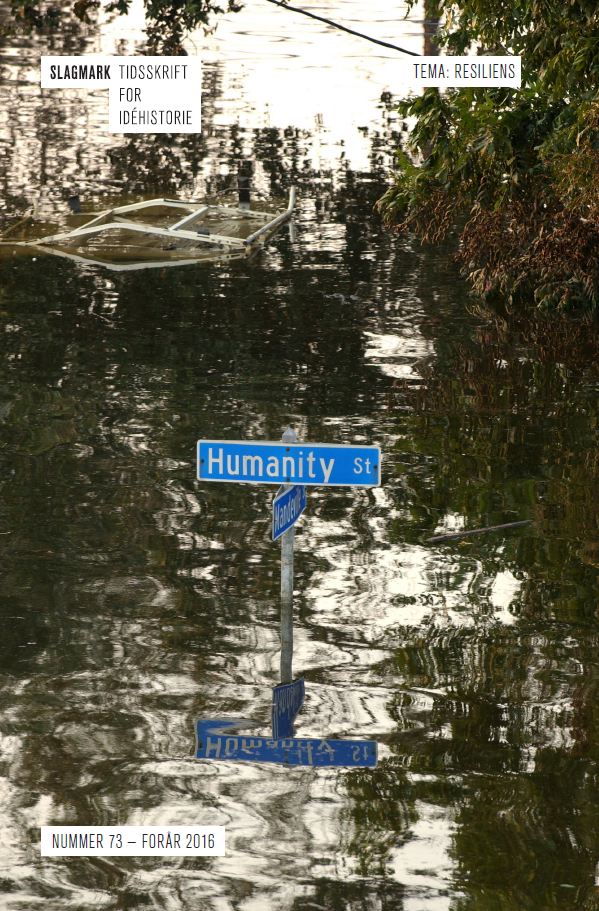Klimaresiliens:
Fra handlingsunderskud til institutionsopbygning
DOI:
https://doi.org/10.7146/sl.v0i73.107233Keywords:
climate change, resilience, action deficit, institutional capacity, institution buildingAbstract
This article addresses resilience in relation to climate change. Currently, our communities are not resilient to climate changes due to a strikingly limited political and scientific framing of climate change as solely a problem of emissions and individual behaviour. Owing to vulgarized interpretations of individual incentives for climate action, contextual barriers to action and the efficiency of individual climate action, this causes an action deficit on both collective and individual levels. We argue that a paradigm shift is needed in order to engage with more adequate academic analysis and efficient policies. This new paradigm should focus on the capacities of societal institutions, which reflect precisely the level of climate resilience in a society. Resilience is not about societal and political immovability when faced with crisis of the dimensions of the climate crisis. It is about changing our society and politics and building institutions that enable us to properly respond to crisis.
References
Ajzen, I. & M. Fishbein (1980). Understanding attitudes and predicting social behaviour. Englewood Cliffs: Prentice-Hall.
Antonetti, P. & Stan Maklan (2014). ”Feelings that Make a Difference: How Guilt and Pride Convince Consumers of the Effectiveness of Sustainable Consumption Choices”. Journal of Business Ethics 124(1), 117-134.
Beck, U. (1997). Risikosamfundet, på vej mod en ny modernitet. København: Hans Reitzel.
Blake, J. (1999). ”Overcoming the ’Value-Action Gap’ in Environmental Policy: tensions between national policy and local experience”. Local Environment 4(3), 257-278.
Clapp, J. & J. Thistlethwaite (2012). “Private voluntary programs in environmental governance: Climate change and the financial sector”, in: Ronit, Karsten (ed.) (2012) Business and Climate Policy: The Potential and Pitfalls of Private Voluntary Programs. New York: United Nations University Press
Csutora, M. (2012). “One More Awareness Gap? The Behavior-Impact Gap Problem”. Journal of Consumer Policy 35, 145-163.
Diekmann, A. & A. Franzen (1999). “The Wealth Of Nations And Environmental Concern”. Environment and Behaviour 31(4), 540-549.
Economist Intelligence Unit (EIU) (2011). Democracy index, 2010: Democracy in retreat. A report from the Economist Intelligence Unit. London: Economist Intelligence Unit.
European Council (2014). “European Council 23/24 October 2014 – Conclusions”. http://www.consilium.europa.eu/uedocs/cms_data/docs/pressdata/en/ec/145397.pdf.
Flynn, R., P. Bellaby & M. Ricci (2009). “The ‘value-action gap’ in public attitudes towards sustainable energy: the case of hydrogen energy”. Sociological Review 57(2), 159-180.
Gausset, Q. et al. (2015). ”Environmental Choices: Hypocrisy, Self-Contradictions and the Tyranny of Everyday Life”. Community Governance and Citizen-Driven Initiatives in Climate Change Mitigation. London: Routledge.
Gundelach, P. et al. (2012). Klimaets sociale tilstand. Aarhus: Aarhus Universitetsforlag.
Hoff, J. et al. (2013). Kolding-borgernes klima- og miljøvaner, CIDEA borgersurvey i Kolding kommune. København: Københavns Universitet.
Kollmuss, A. & J. Agyeman (2002). ”Mind the Gap: Why do people act environmentally and what are the barriers to pro-environmental behavior?”. Environmental Education Research 8 (3), 239-260.
List, C. & Pettit, P. (2011). Group Agency: The Possibility, Design, and Status of Corporate Agents. Oxford: Oxford University Press.
Moberg, F. & S. H. Simonsen (2014). What is resilience? An introduction to social-ecological research. Stockholm: Stockholm Universitet.
Ostrom, E. (2012). “Green from the Grassroots”. Project Syndicate 12, 1-3.
Peters et al. (2013). ”The challenge to keep global warming below 2 °C”. Nature Climate Change 3, 4-6.
Prins, G., & Rayner, S. (2007). The wrong trousers. Radically re-thinking climate policy. Oxford: James Martin Institute for Science and Civilisation.
Sagoff, M. (2008). The Economy of the Earth: Philosophy, Law, and the Environment. Cambridge: Cambridge University Press.
Scavenius, T. (2014). Moral Responsibility for Climate Change. A fact-sensitivepolitical theory. København: Københavns Universitet.
Scavenius, T. & S. Rayner (2016). “Introduction”, in Institutional Capacity for Climate Change Response. Scavenius, T. & S. Rayner (red.). London: Routledge Earthscan. (under udgivelse)
Special Eurobarometer 409 (2014). Climate Change. Report. http://ec.europa.eu/public_opinion/archives/ebs/ebs_409_en.pdf
Stern, P. C. (2000). ”Towards a coherent theory of environmentally significant behavior”. Journal of Social Issues 56(3), 407-424
The New York Times & Stanford University (2015). Resources for the future. Poll on global warming. http://www.nytimes.com/interactive/2015/01/29/us/politics/document-global-warming-poll.html.
Thøgersen, J. (2005). “How may consumer policy empower consumers for sustainable lifestyles”. Journal of Consumer Policy 18, 143–178
Urry, J. (2008). ”Climate change, travel and complex futures”. The British Journal of Sociology 59(2), 261-279





